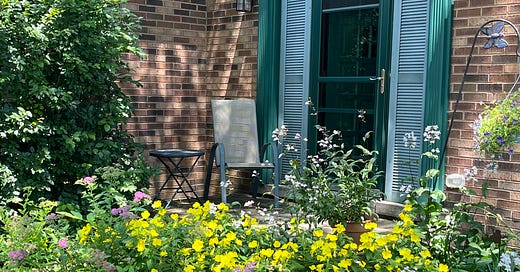“Home can be a genuine community, where love overcomes isolation. In recent years, researchers have discovered that people and families who engage in spiritual practices at home are generally happier, more involved in the community, and healthier.”
Diana Butler Bass, in Grounded: Finding God in the World, A Spiritual Revolution
As young, rather naïve Christian parents, my husband and I would occasionally attempt “family devotions” with our toddlers, which went about as well as you could expect (not that well at all).
I’d disagree with my husband’s interpretation of a passage. We were wildly inconsistent. Our small squirmy kids wouldn’t pay attention. Or they’d ask weird questions that had nothing to do with the topic. (“Are penguins friendly?”—actual random inquiry from my daughter at age 3)
When our kids were five and seven, though, we stumbled upon a spiritual practice we could engage in as a family to bless others. It turned out to be a catalyst for growth in all of us. We began to practice hospitality as a family, intentionally welcoming people into our home. Our home became a place where love overcame isolation. We grew closer to God and one another.
We were, conveniently, part of a church that would refer us visiting pastors in need of a place to stay for a week or two. People from around the world came through our door, gathered at our table, and gave us great practice in loving our neighbors—even as it expanded the very definition of neighbor. My children got to “see the world” without ever leaving home.
I recently discovered the work of Diana Butler Bass. I’m loving her book Grounded, which I quote from above. She goes on to write:
“Domestic spiritual practice does not focus solely upon familial devotions. Instead…the emphasis is on moral practices. And two locations have emerged as particularly sacred: the front door and the table, the physical places at home where we form the spiritual habits of hospitality and gratitude.”
Don’t you just love that? The door and the table, places we form holy habits.
My front door recently.
Think about your home—whether it is a house, apartment, whatever. Every home has a door. Have you ever thought of your front door as sacred? Have you considered that opening it can be a spiritual practice?
A door can stay closed, locked, bolted. It serves as a metaphor for our fears. A door can keep others out, protect our privacy, and our stuff. But what happens when we open the door of our home, and the door of our heart, to others? We set our fears aside, and soon, they flee.
The table is just a piece of furniture. When others gather around it, though, it becomes something entirely different. It is a place we can gather our family and invite others to join us. This is not about perfect table settings but inviting extending generous welcome. It’s about letting people know that we have room for them, we are willing to share what we have. It provides an opportunity to let faith overcome fear.
Sharing a meal with our guest, Nestor. Your table does not have to be fancy.
Bass goes on to say, “A door is the place of coming and going, of safety and protection, and of welcome. …The table is another school for holy habits…the table reminds us that the center of our lives is a feast in which we celebrate the gifts of food and community and remember our ancestors and the Giver.”
What does it mean to engage in spiritual practices at home? How can you form spiritual habits of hospitality and gratitude?
Last week we talked about extending hospitality to your family. We can also practice hospitality with our family—a practice our kids were much more enthused about than family devotions. It can be as simple as inviting others to gather at your table, or in your home.
Hospitality and generosity are conjoined twins. The practice of welcoming, of extending hospitality, requires a generous spirit. You are sharing your space, often your food, your resources, in order to welcome another.
In my book GodSpace, I wrote about both these practices, and noted their connection. “Generosity and hospitality, in divine alchemy, turn scarcity into abundance.”
Both hospitality and generosity require an abundance mindset—but they also produce an abundance mindset when we simply practice them—even if our practice is as awkward as my “family devotions” were years ago. They flow from trust in God and in your fellow humans. They affirm that there is enough to share.
You cannot be hospitable, welcoming, without practicing generosity. But when you choose to welcome others, you’ll find your capacity for generosity expands. Conversely, when you take a small step of generosity, God grows your willingness to welcome others, to gather and give. You tap into the abundance of God. You find whatever you give flows back to you in the form of joy, satisfaction, divine presence.
Leave a comment! Tell us about your experience with holy habits of hospitality and gratitude.
P.S. GodSpace, which explores seven practices including generosity and hospitality, is just $9.99 on Kindle right now.








I just about spit out my tea when you mentioned disagreeing with your husband about the interpretation of a passage while in the midst of awkward family devotions. Been there! 😂
Great reminders. I love the concept of the door and the table as the sacred places. Thanks, Keri!